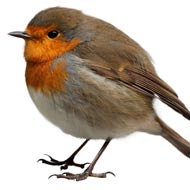Criminal gangs kill ‘millions’ of songbirds in Cyprus

Hundreds of thousands of birds, including blackcaps and robins, were killed at the small British Sovereign Base Area last autumn.
A new report reveals more than 800,000 songbirds were killed at a British military base in Cyprus last autumn. Bird conservation charities are calling for support from the UK government and a crackdown on Cyprus restaurants selling illegal delicacies.
Surveillance work by the RSPB and BirdLife shows that hundreds of thousands of birds, including blackcaps and robins, were killed at the small British Sovereign Base Area (SBA) between August and October last year.
Killed songbirds are sold on the black market to restaurants in the Republic of Cyprus that serve the controversial delicacy, ambelpoulia, which is a plate of cooked songbirds. The practice has been illegal for over 40 years, but conservationists say enforcement against restaurants has been virtually non-existent.
The trapping and selling of songbirds for ambelpoulia is said to be driven on a huge scale by organised criminal gangs that are estimated to earn millions of Euros every year.
SBA police officers opened more cases and seized more trapping nets than ever before last autumn. However, operations to remove non-native trees on Ministry of Defence land - which the RSPB says are planted by trappers to lure the birds in - have been abandoned due to pressure from illegal trappers community. RSPB is calling on the UK government to provide urgent support, ensuring the work continues.
The SBA administration successfully removed 54 acres of Australian acacia trees in the previous two years, but last autumn only seven acres were removed, leaving 90 acres. According to the RSPB, efforts were abandoned following large protests and a dramatic blockade by the illegal trapping community. There are concerns that parts of the range are becoming ‘no-go’ areas for outnumbered local police.
It is estimated that as many as 1.7 million birds could have been killed in the survey area, which covered the British base and Cyprus Republic areas. Across the whole of Cyprus, nearly 2.3 million are estimated to have been lost to illegal trapping. In total, the number of nets for trapping in British territory has risen by 183 per cent since records began in 2002.
RSPB conservation director, Martin Harper, comments: “This report sadly highlights that the British base is the number one bird killing hotspot on the whole island of Cyprus. Many much loved garden bird species are being trapped and killed for huge profit by criminal gangs.
“The trappers’ brazen prevention of the removal of their criminal infrastructure from MoD land could never be tolerated here in the UK. The UK Government must therefore provide enforcement support to help the Base authorities respond to the trappers and safely remove the remaining 90 acres of acacia so that they cannot be used to kill hundreds of thousands more birds.”
Martin Hellicar, director of BirdLife Cyprus, adds that “we cannot ignore the distasteful fact” that restaurants are serving ambelpoulia in Cyprus. “Enforcement against these law-breaking restaurants has been limited – at best – in recent years, and the Cypriot authorities must change this. We need a clamp-down on the illegal market supporting this wildlife crime, something the European Commission has called for, repeatedly.”



 The Veterinary Medicines Directorate (VMD) is inviting applications from veterinary students to attend a one-week extramural studies (EMS) placement in July 2026.
The Veterinary Medicines Directorate (VMD) is inviting applications from veterinary students to attend a one-week extramural studies (EMS) placement in July 2026.